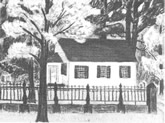Samuel Livermore was born in 1732 in Waltham, Mass. He taught school, attended Princeton, studied law and was admitted to the bar in 1756 and began his practice in Portsmouth in 1757. In 1759 he married Jane Browne, daughter of Portsmouth’s Episcopalian pastor.
Livermore’s Connection with Robert Rogers
Jane’s sister, Elizabeth, married Robert Rogers (born in Dunbarton, NH in 1727) leader of the famous Rogers Rangers, so Livermore and Rogers were brothers-in-law.Rogers exploits were made famous in Kenneth Roberts Novel "Northwest Passage", as well as a movie of the same name. Revolutionary war hero John Stark, served under Rogers as a Lieutenant. In 1766 Rogers was charged by the crown with treason. Although acquitted, his wife Elizabeth divorced him. During the Revolution, Rogers offered his services to Washington, however, Washington refused, fearing Rogers had loyalist sympathies. Rogers then fought on the side of the crown, and died in obscurity in London in 1800.
Livermore’s Political Career
Livermore’s political career began in 1768, when he was elected as a representative to the colonial legislature. In 1769 he was appointed Attorney General of the Province in New Hampshire, a post he held until the Revolution established a new government. The Livermores moved north to Holderness during the winter of 1775 -1776. Livermore had owned land in Holderness since 1761 and had begun intensively developing his property in 1774. Some historians have speculated that Livermore’s move from the colonial capitol to a still primitive frontier town was prompted by a desire to avoid entanglement in the impending Revolution. Whatever his motives, Livermore was soon the most prominent citizen and largest landowner in Holderness.
Although Livermore spent the early days of the revolution tending to his farm and gristmill in Holderness, he soon cast his lot with the new government. In 1776, he was again appointed Attorney General, this time for the new State of New Hampshire. In 1779, Livermore was appointed a commissioner to represent New Hampshire before Congress in the controversy over the New Hampshire Grants (Vermont). This was followed by his appointment as a Congressman, a position he filled in 1780-82 and again in 1785. From 1782 to 1790 he also served as New Hampshire’s Chief Justice.
In 1788, Chief Justice Livermore was a delegate to the state convention called to consider the proposed national constitution. He was a leader of the group seeking acceptance. It was on Livermore’s motion of June 21 that New Hampshire became the ninth and ratifying state to approve the Constitution, thereby establishing the United States Constitution as the law of the land. Three years later, as president of the convention to revise the state constitution, Livermore was equally instrumental in establishing the present New Hampshire Constitution.
Samuel Livermore was elected one of New Hampshire’s first Congressmen, serving two terms from 1789 through 1793. He was then twice appointed United States Senator by the legislature, and served from 1793 till ill health forced his resignation in 1801. He died in Holderness two years later and lies buried next to Trinity Church.
The Churchyard Cemetery Association, which has preserved and maintained the church and surrounding cemetery in their pristine state since purchasing it from Arthur Livermore Jr. in 1854, would welcome your assistance in continuing our mission of perpetual care.
© Barry Borella 2005
 Trinity Churchyard Cemetery
Trinity Churchyard Cemetery Trinity Churchyard Cemetery
Trinity Churchyard Cemetery